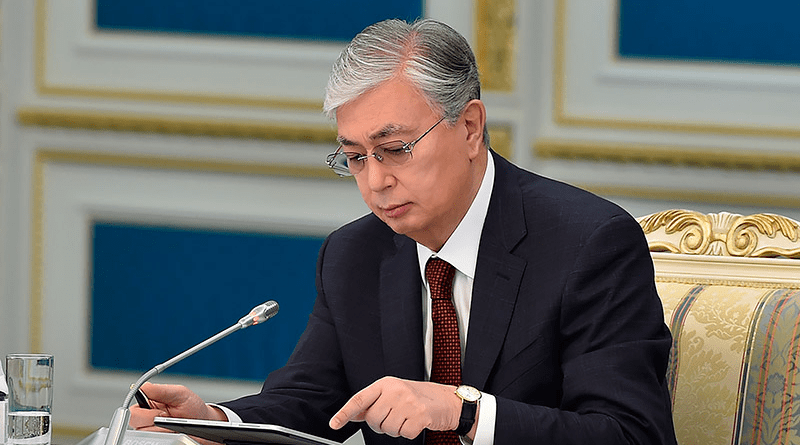Kazakhstan’s New Economic Direction Strengthens Development And Enhances Its Geostrategic Centrality – Analysis
On September 1, 2023, Kazakhstan’s President Kassym-Jomart Tokayev unveiled a “new economic direction” in a sweeping 90-minute national speech, indicating a significant pivot in the nation’s development path. Under the theme “Economic Path for a Fair Kazakhstan,” Tokayev detailed impending economic and policy changes spanning several primary domains, including business, finance, trade, defence and transportation.
This plan serves as a crucial blueprint not just for Kazakhstan, but potentially for the whole Central Asia region, especially in the context of current global geopolitical and energy challenges. Kazakhstan’s recent economic performance has been commendable, despite tough international conditions. In 2022, the nation’s gross domestic product (GDP) exceeded $220 billion, foreign investments reached $28 billion, and total international trade (exports and imports combined) topped $134 billion. In his speech the President ensured that “honest business will always be under the protection of the state.”
Nevertheless, Tokayev acknowledged in his speech that becoming a developed country necessitates broad social and economic metamorphoses. In particular, he underscored the need for economic variety to stay competitive in the rapidly evolving global market. He proposed a fresh economic approach centred on fairness, inclusiveness, hands-on pragmatism and feasibility, emphasising crucial contributions towards achieving economic independence not only in the transit/transportation sector but also in manufacturing.
Tokayev nevertheless singled out the transportation domain as central to the nation’s economic ascent, asserting that Kazakhstan needs to solidify its foothold in this arena. While the sector represented 6.2% of the GDP in 2022, ambitions are set to elevate this figure to at least 9%. The developing Trans-Caspian International Transportation Route (TITR) promises substantial economic growth. This alternate transit channel across the Caspian Sea offers access to Western markets.
Tokayev’s vision is to see a fivefold increase in transit activity through this path in the near future. Harnessing the full potential of this route, however, entails meticulous management and the launch of diverse infrastructure ventures. In his address, Tokayev named the Dostyk-Moyinty, Bakhty-Ayagoz and Darbaza-Maktaaral railways as foundational projects for realising the TITR’s economic promise.
Kazakhstan’s transformative initiatives in transportation and economic development, which are already showing success, do more than advance its own people’s well-being. They also have the potential to catalyse regional growth and global prosperity. By positioning itself as the nucleus of an important transportation network, focussing especially on the trans-Caspian corridors, Kazakhstan is paving the way for increased trade and economic cohesion among Central Asian nations.
The growth of Kazakhstan’s infrastructure inevitably spills over to neighbouring regions and enhances their connectivity. Their intertwined economic ties will foster mutual prosperity and political stability. An evolution of the transportation network presents new possibilities for trade, makes the region more attractive to foreign investments and instills business confidence in the wider Central Asian region.
The country’s notable successes with its reforms have not only bolstered its own growth but also set a prominent benchmark for its neighbours. Through what is often called the “demonstration effect,” Kazakhstan’s best practices in governance and strategic economic planning become widely recognised and accessible public knowledge. Its example thus provides a clear, effective template, offering invaluable inspiration for surrounding nations to embark on similar transformative journeys.
As international stakeholders increasingly recognise Kazakhstan’s potential, they are incentivised to explore burgeoning opportunities in the region at large. A ripple effect of economic development follows. Kazakhstan’s emphasis on fostering robust ties with its neighbours amplifies regional cooperation. Shared initiatives engender cultural exchanges and mutual understanding, creating a business and political ecosystem ripe for long-term stability. Tokayev has restated his vision for interconnected Central Asia as all five regional leaders gathered in Dushanbe for the Fifth Central Asian Summit on September 14th.
Tokayev’s newly announced plans bring into sharp focus the unique geostrategic position of Central Asia as a crucial bridge connecting Europe and Asia with an unmatched potential to facilitate East-West commerce. With economic growth, a direct correlation to political stability is established. The tangible benefits reaped from local international cooperation, combined with focussed regional development, already point in the direction of making Central Asia an anchor of geopolitical stability.
Such steadfastness can have positive ripple effects, shaping both broader Asian and global geopolitical frameworks. Kazakhstan’s forward-thinking economic and political initiatives, and informed strategic decisions taken under Tokayev’s leadership have the potential to lead neighbouring territories into a new era marked by further growth and enduring stability.

